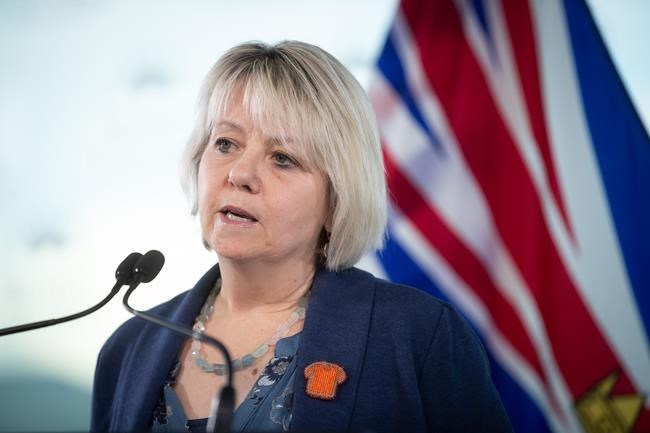
B.C. provincial health officer Dr. Bonnie Henry speaks during a COVID-19 update news conference, in Vancouver, on Tuesday, February 1, 2022. THE CANADIAN PRESS/Darryl Dyck
Republished March 10, 2022 - 4:05 PM
Original Publication Date March 10, 2022 - 1:06 AM
VICTORIA - British Columbia will lift its mask mandate and capacity limits for faith gatherings on Friday, while restrictions of visitors at some long-term care facilities will be dropped, as long as they are fully vaccinated and tested for COVID-19 when entering.
Provincial health officer Dr. Bonnie Henry said cases of COVID-19 have declined 34 per cent in the last month and as transmission goes down, so do the risks of contracting the virus.
"While today is another really positive step forward, we have to be ready to bring some tools back, if necessary, depending on the situation as it changes," Henry told a news conference Thursday.
Starting on April 8, the B.C. vaccine card will no longer be needed to access restaurants and other venues, while businesses can shift away from their COVID-19 safety plans.
Public health orders requiring safety plans to be submitted to a medical health officer for overnight child and youth camps will also be lifted on Friday. Masks, physical distancing and restrictions on visitors at schools will be rescinded when students return from spring break on April 4 in most districts.
However, Henry said any students or teachers who wish to continue wearing masks should be supported.
"The need for every single one of these particular layers of protection has dropped below the threshold where we need to have an order for them to be in place," she said. "That means we can move from a mandated approach to an empowered self-management approach."
Henry said that by March 18, most long-term care facilities are expected to be ready for more visitors who can resume supporting their loved ones, but staff shortages are an issue at some sites.
"Operators may need to manage visitation based on the situation with each individual care home. So what I'm asking for is patience over the coming week. All of the care home operators will communicate with families around their plans for resuming broader social visitation," she said, adding visits may have to be planned in advance or spaced out in some cases.
British Columbia did well in containing the latest wave of COVID-19 compared with other jurisdictions across the country, with lower infections and hospital admissions, she said.
The science shows the risks are much lower, and while they are not zero, she's confident health officials can safely make the changes, Henry said.
Masks and the vaccine card may still be required by some businesses, including those that are federally regulated.
Henry said she will continue to wear a mask on transit and anyone who wears one in whatever situation they're in, or chooses to maintain a physical distance, may be immunocompromised, so it's important for others to be respectful of individuals' situations.
TransLink, which operates bus and train service in Metro Vancouver, announced Thursday that masks would no longer be mandatory starting Friday. However, it said customers and employees would still be required to wear masks on HandyDart, the service that supports those who are unable to navigate conventional public transit without help.
She cited high vaccination rates as a factor in dropping restrictions. But the percentage of vaccinated children between the ages of five and 11 remains low, with about 30 per cent of those in that age range having received two doses, according to data from the BC Centre for Disease Control.
Both Henry and Health Minister Adrian Dix have called on more parents to get their kids vaccinated.
Teri Mooring, president of the BC Teachers' Federation, said she has called for a dedicated awareness program to ramp up vaccination rates by having clinics in schools.
"We're hearing that work is being done in this respect, but it's not been effective enough because those rates are extremely low," Mooring said.
The province reported 336 new cases on Thursday and four more deaths, for a total of 2,932 fatalities from COVID-19.
It said 91.3 per cent of eligible adults have received their second dose of a vaccine, and 58.3 per cent have had three doses.
— By Camille Bains in Vancouver
This report by The Canadian Press was first published March 10, 2022.
News from © The Canadian Press, 2022